#and the daily goal was 50 words
Text
40O PAGES INTO THE BROTHERS KARAMAZOV ONLY 300 LEFT TO GO I CAN DO THIS GO GO GO GO
#jelly.txt#only thing is i'm trying to finish it like. within the next three days. which will be hard#because this book has such a small font size and as many words as possible on each page#so it takes me like 2 minutes per page so it is EXHAUSTING to read for more than 3 hours at a time#i set my daily goal to 50 pages but i'm gonna need to speed this up!!
10 notes
·
View notes
Text
Returning to my doc folder for my book has a mixed feeling of dread and euphoria. Because one on hand, I didn’t realize how well fleshed out many of these characters and ideas were. But on the other hand… I have 22 fucking documents full of words and past me did a really bad job explaining in the title what’s in them.
#shelti rambles#writing#like I have these two docs “outline” and “outline 2” that’s extremely unclear of its contents how detailed it is and how much is relevant#there’s one doc just labelled “idea pit” and I haven’t opened it yet but I know there’s 50+ pages of text in there and there’s no labels#so there’s going to have to be this lengthy processing of shifting through it all and that’s going to take a while#also there’s a spreadsheet with my recorded word count by day for like 3 months which is useful… but I forgot what my daily word count goal#-was. I KNOW I had one. But I don’t think I wrote it down anywhere which frustrates me.
2 notes
·
View notes
Text
I would like to share the story of Khaled Smeer, who once lived a stable life as the manager of one of the largest malls in Gaza. In addition to his management role, Khaled worked as an English translator, leading a busy life filled with activity and interaction with others. He lived in northern Gaza with his family, and everything was going well until the war broke out.
As the conflict intensified and the bombings escalated, Khaled’s home was completely destroyed. In a matter of moments, he and his family lost everything they had; no home to shelter them and no resources to rely on. Life was no longer the same. Now, Khaled lives in northern Gaza, where conditions worsen every day. They are struggling with severe hunger, with no access to the basic necessities of daily life—no food, no clothing, and no safe place to stay.
In the face of this tragedy, Khaled decided to start a campaign asking for help. He isn’t just asking for himself, but for all those who suffer like him. Khaled is trying to leave Gaza in search of safety and a chance to start over. However, he faces a significant obstacle: it costs 5,000 USD per person to leave when the border crossing opens.
Khaled’s words are filled with both pain and hope. Today, he is asking for your help, whether by sharing his story or donating to his cause. Every small contribution makes a difference. Thank you to everyone who reads Khaled’s story, and to all those who offer any form of support for Palestine. ♥️
$585 AUD raised of $60,000 goal
Note: The currency is Australian Dollar (AUD). The exchange rate is approximately: • 10 AUD ≈ 6 USD • 50 AUD ≈ 32 USD • 100 AUD ≈ 65 USD • 200 AUD ≈ 131 USD
@khaledshawikh
Sorry for the share
@appsa @a-shade-of-blue @a1m3v
@transmutationisms @nightydraws@mimiqyu
@grapejuicedragoon @boostpOwer @ohwarnette
@mothblossoms@zigcarnivorous @xzbat-loverzx
@degenderates @briarhips @bunnie-the-idiot
@brutaliakhoa @claudiasescapesubmarine
@commissions4aid-international @doug-dimmadumb
@deepspaceboytoy @feluka @flower-tea-fairies
@girlinafairytale @halalchampagnesocialist
@hametsukaishi @irhabiya @kordeliiius @killaltrock
@kyra45-helping-others @kit-today @laurapalmerss
@lovewontfindherwayhome @malcriada
@mushroomjar @neptunerings @planetgraves
@pocketsizedquasar-2 @queerstudiesnatural
@rhubarbspring @riding-with-the-wild-hunt @s8n66
@strawberrysnipes @schoolhater@sawasawako
@the-bastard-king @three-croissants @tortiefrancis
@wellwaterhysteria @xinakwans
#free palestine#palestine 🍉#freepalastine🇵🇸#free gaza#gaza under bombardment#end israeli occupation#end israeli terror#save 🍉#all eyes on rafah#gaming
3K notes
·
View notes
Text
| September goals





1. Daily Self-Care Routine
Start small by adding one or two self-care habits to your daily routine, like stretching for 5 minutes in the morning or writing down three goals for the day ( like drinking more water ).
2. Be kind to yourself
Tip: Create a habit of switching your mindset and words. Try saying “I am capable of achieving my goals” or “I deserve to take care of myself.” instead of discarding your needs and feelings.
3. Add little challenges to your day
Try a 30-day personal challenge, like journaling every morning, starting a workout routine, or reading 10 pages of any book you like each day.
4. Dealing with burnout
Reserve one day of the week for self-care and doing things you enjoy. Even if you can't take the full day for yourself try to make it at least two hours for a good and relaxing shower, taking care of your skin, hair and body. Maybe you can even treat yourself to your favourite meal!
5. Productivity Hacks
Break tasks into smaller, manageable chunks, and set a timer (like the Pomodoro technique—50 minutes of work followed by a 10-minute break) to stay productive without feeling overwhelmed.
Tip: If a task takes less than two minutes to complete (like answering a quick email or tidying up your desk), do it immediately. This prevents small tasks from piling up and becoming overwhelming.

That's all!! Tell me if you'd like more tips.
Stay healthy, stay happy and be kind!
#that girl#wonyongism#clean girl#pink pilates princess#clean girl lifestyle#aesthetic#girlblogging#productivitytips#health and wellness#lifestyle#divider by v6que#study motivation#studyblr#it girl#glow up#booklr
707 notes
·
View notes
Text
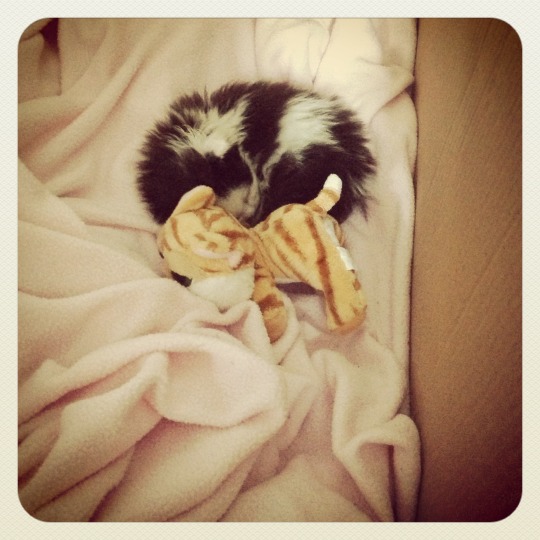
Hello everyone,
As you may have already heard via socials, Oreo was diagnosed with large cell Lymphoma on Wednesday. Not only this but he also has multiple lesions in many areas of his abdomen (so not just the one they originally saw). Because of this, the masses are inoperable. The large cell also grows much faster than the small cell. It's not the best news, but at least now we know what we're dealing with.
I was given three choices of treatment ranging from the most aggressive to the least aggressive. The most aggressive being a weekly IV at the clinic in Montreal. The second was every two weeks and the third option was a pill once a month along with steroids given at home daily. There's no way that Oreo will be able to go for weekly visits in his condition. Nevermind the long drive plus the traffic there and back. Therefore, I chose option 3 and went with the chemo pill. He has his first pill on Wednesday and if we see an improvement, he can go back in a month's time for a second pill. If we don't see any improvement, we can stop. Regardless of the treatments, Oreo was given a maximum of 6 months with the most aggressive. So we know where this is all going. My goal here is to keep him as comfortable as possible for the remainder of his time here and have the least vet visits possible as well.
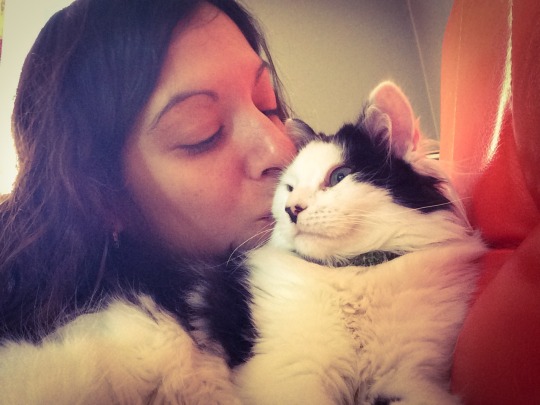
Yesterday he wasn't doing well at all but the chemo can largely affect appetite and other things for the first few days. We had a technician from our local clinic come to our home to administer fluids yesterday. This seemed to help him a bit. I've also arranged with the same clinic that when the time comes, they can help him to move on here at home. I know it's sad but these are all things I need to think about and I want to be sure that he's comfortable for every step of the way.
The pill has a 50% chance of working so we will see what percentile he is in within the next couple of weeks. The other treatments have a higher percentage rate but they're much more difficult on the animal. We were lucky this week that the appointment fell during the construction holiday so the traffic was not bad. Once the holiday is over, it may take upwards of 2 hours to get to the clinic at any time of day. I don't think that's fair to Oreo.
Oreo ate this morning around 4 am with the others. He ate a small bit again around 7:30. I will go to get him some new type of food that was suggested by a friend later today. For the remainder of his time, he can eat whatever he wants.
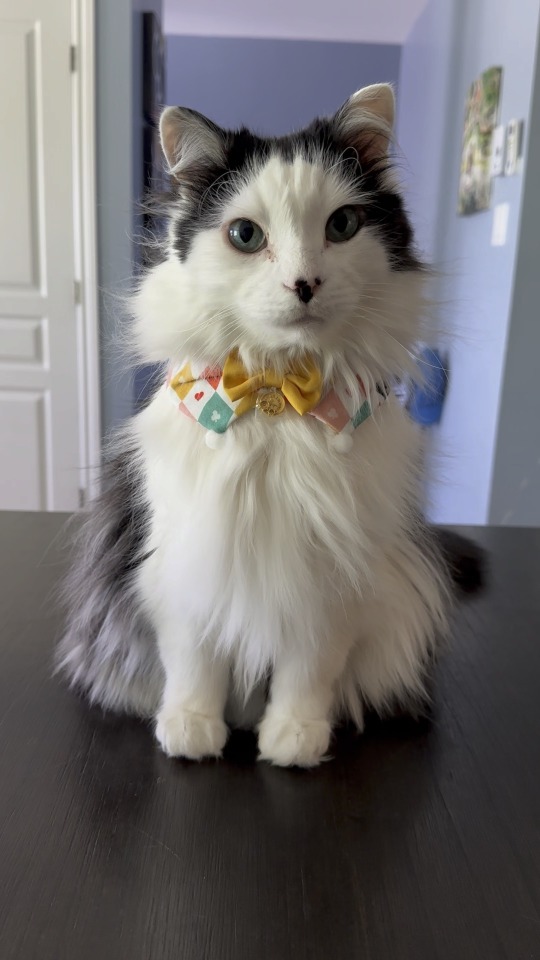
Thank you all once again for your kind words, generosity and continued support.
Tina.
557 notes
·
View notes
Text
Okay if you write. Listen to me.
Set a daily word goal. Not a big one, because you won't be able to make it every day, you will likely procrastinate and not write at all, or feel guilty about not making the goal.
Set a small goal. Set a tiny goal if you have to.
400? Amazing. 100? Wonderful. 50? Heck yes. One fucking sentance? VALID.
Mine is 200 words a day. I haven't felt particularly inspired recently, but over the past month I've written at least 200 words nearly every day.
Which leads me into my next point: if you have to skip a day THAT'S OKAY. There will come a day when you feel really inspired and write 2000 words, and you'll make it up.
Sometimes I write 200 words and then my creativity runs out, but sometimes I sit down and write a whole lot.
Since I started doing this, my story has progressed so fast, and I feel like this is probably going to be the first full-length novel I finish.
Obviously this method isn't for everyone, but I recommend you try it. If it doesn't work for you that's fine! Find something that does.
#writing#writing help#writing things#writers of tumblr#writing tips#writerblr#writer#writers#writers on tumblr#writeblr#story#words#word goal#advice#writing advice#word count#creative writing#novel
2K notes
·
View notes
Text
how to create a leveling up/dream girl/rebranding plan 🤍🍸🖤



establish your aesthetic
first thing’s first, you need to know where you want to go in life and what is your “aesthetic”? do you want to be giving “classy, businesswoman”? what about “nyc socialite”? of course these are just examples, but you should know what type of girl you want to embody. remember, you don’t have to fit a narrative, but you should have a general “aesthetic” that you want to be associated with. even if it’s 50 million different aesthetics, it’s whatever makes you, you.
visualize yourself/life
get inspired by making a vision board (physical or digital) and add to your board (if digital) daily. i find that this helps you stay in alignment with where you want to be in the future. you have to stay in that frequency and remind yourself of what’s next to come… because this new life is what’s next to come.
start with habits
please refer to my “starting your leveling up journey” post, but basically— you should create 1-3 habits for each of your goals and work on them until they become second nature. then when you’re ready, start implementing more habits that are aligned with your goals.
create routines with your habits
can you incorporate some of these new habits into a morning or evening routine? we all know that routines are important— they almost become our personalities and they set the tone for the day and night, and even the next day. for me, i know i’m only inspired to exercise in the morning around 10am, so exercise is part of my morning routine.
create daily + weekly goals
let’s say part of your journey is learning a new language. a daily goal could be learning one new vocabulary word in that language. your weekly goal could be knowing the alphabet in that language. use this method for all of your goals.
don’t overwhelm yourself with goals, routines, and habits
start slow; don’t overwhelm yourself. if you want to work on one goal at a time, then work on that one goal. burnout is real and it’s very hard to get back into the swing of things afterwards. i understand most of us are impatient when we just want to be a different version of ourselves, but it’s going to take some adjusting. i suggest not working on more than 3 things at once, but if you can work on more, go ahead
be a part of a community to keep you accountable
tumblr and facebook groups in my opinion are the best ways you can connect with other women who are working on the same thing. you can inspire one another, bounce ideas off of one another, and it’s super fun. you might want to even document your journey online.
set milestones and have a reward system
let’s say you would like to lose or gain weight, no matter the number, focus on 5-10 pound increments. when each milestone is successfully completed, reward yourself with something nice. maybe it’s getting your nails done, or splurging on a product that everyone on tiktok keeps talking about. apply this to any of your goals where there are milestones to get to.
don’t waste the day
you should not have any “zero days” meaning… you should be doing at least one thing everyday to reach a goal(s) you have. it doesn’t matter if one goal was to maintain a more organized, clean environment— do your dishes, set the trash out, clean up the hair from the bathroom sink, etc.



#leveling up#femininity#hypergamy#personal development#that girl#level up#level up journey#self care#self love#leveling up journey#luxury#levelling up#level up tips#leveled up woman#leveling up tips#dream girl journey#dream girl#dream girl aesthetic#that girl aesthetic#high standards#soft girl aesthetic#soft life#hyperfemininity#hypergamous#feminine journey#feminine aesthetic#traditional femininity#feminine inspiration#femininity journey#advice
5K notes
·
View notes
Text
ELITE CHANGES: THE (R)EVOLUTIONARY NEW FIVE-PART TEXT COLLABORATION FROM ALPHA RHYS AND AVIS SAPIENS

ALPHA RHYS (@kingalpharhys) and AVIS SAPIENS (@avissapiens) are back just in time for the shifting of the seasons with our newest collaboration; an electrifying new written series. Separately, we have a masterful grip on our respective lives and careers; professionally and personally soaring to new heights each and every day. Having successfully worked together in the past, we have put in the tireless effort to nurture both a strong friendship and a smooth working relationship. We share an immense proverbial library of knowledge and experience between us; we often have invigorating conversations on topics ranging from law to sociology, and everything in between. When it comes down to it, there really is no better team to impart their refined wisdom onto our fellow man and mean every word.
With this new collaboration, we hope to efficiently and effectively communicate what appears to be the simplest human concept; evolution. Evolution as it pertains to personal growth, changes in lifestyle, ideology, and intentions, and how these natural changes can be perceived, processed, and practiced in all of our daily lives.
This is an overarching topic near and dear to both myself and Avis, with a hyperfocus on my own desire to take my virtual personality in a new direction; one that better aligns with the man I am today. I have known for a long time now that the perpetuation of who I once was was neither sustainable nor healthy; I simply did not know how to go about the change as it pertained to my presence, particularly as it pertains the blog on which you are reading this now. To my surprise, while developing this project with Avis and speaking to a select trusted group of men on here, I discovered I'm not the only one who feels they've outgrown at least their digital presentations, seeking the pursuit of a more fulfilling online presence; one which matches the men they are in their real lives and conveys that proudly for all to witness. In doing this project, our utmost goal is to express our own vast growth, from young, seemingly well-intended, though (sometimes) misguided fratty brahs to well-rounded, productive, independent elite men. In doing so, and communicating what we've discovered on our own journeys, we hope to inform, enlighten, and maybe even inspire some of you who may feel the same way but not know how to go about the intricacies of your own personal journey.
We hope that you'll set aside any prejudice you may possess to embark on this new adventure with us, and learn what it means to be the best possible version of yourselves; it's what you deserve. It's the Elite way; it's the Alpha way.
Text and imagery are a complete collaborative effort between Alpha Rhys and Avis Sapiens; employing an overall halved 50/50 workload to ensure our messaging and vision are combined and communicated as concisely as possible. That said, primary contributors to each chapter will be credited for their work accordingly.
68 notes
·
View notes
Text
EOA1 ==> Media, Agency and the Suburbs in Act 1 of Homestuck




It is April 13, 1959. Mr. Egbert, Sr. has recently made the move out of the city into a newly built house in the suburbs, because clowning isn't paying so well after the recession. His son John hasn't seen his friend Rose since they moved. Staring out the window at 4:13pm and glimpsing nothing but the neighbor's wall, John goes downstairs to catch the second half of a black and white episode of Truth or Consequences, losing himself for fifteen minutes in their world of pranks, hilarity and emotional family reunions. Hopefully for his birthday, his dad will get him that cool new board game and its all-important hours of distraction.
We pick up the daily newspaper, and flip to the funnies to see John's new antics.
(Essay below the cut - about 5k words.)
==> I: John’s Suburb in Historical Context, or: Johntext
During the 1940s and 1950s, mass expansion of the American suburbs was accompanied by a ‘best of both worlds’ promise. Families who moved there could enjoy easy travel to the city via car for work and leisure, but wouldn’t have to deal with the ‘undesirable’ parts of city life, such as noise, pollution, or people from marginalized groups. Suburbs were characterized by detached, single family houses that guaranteed each family their own bubble of space away from neighbors, but also promised a community of likeminded people with whom to form neighborhood associations and PTA committees. Residents could enjoy independence from city governance and increased control over their own living spaces, but anybody who might push back against current social norms would be quietly excluded. Utopian promises and attractive prices encouraged many Americans to make the move, and many of them have never left.
Here in 2009, it’s not uncommon for people to have lived their entire lives in the suburbs - often in a single house. Promises of progress and innovation within households have remained strictly cosmetic, while the values guarding suburban families and communities have changed very little. Although people of color comprise an increasing percentage of suburban residents, white people are still overrepresented. The same is true of married couples’ overrepresentation compared to other family structures. Suburban architecture remains centralized around the car as the primary means of transportation, and the separation of residential from commercial areas. Opportunities and reasons to leave the house are both minimized.
With the growth of the suburbs came increased criticism of their designs and ideals. Their dream of a spacious home for each family has led to feelings of isolation, while the promised communities have primarily formed around churches and strict Christian ideals. Residents lack trust in their neighbors, and as such, children are no longer left to their own devices outside of the house. The suburban goal of easy car accessibility to cities has ended in highway congestion, air pollution and lack of public transport or pedestrian access. And while the percentage of Americans living in the suburbs continues to increase, not everyone has the luxury of choosing where they live - particularly children and teenagers.
Homestuck’s main character John Egbert doesn't directly express a hatred of the suburbs - he seems more conflicted, showing fondness for the tire swing in a kid's yard (p.27), the fireplace (p.50) and the father smoking a pipe (p.74), while also expressing that he feels stuck in his home (p.30, 253), that he avoids his father's company (p.30), and that he feels something missing from his life (p.82). He doesn't seem aware of the source of his emptiness, just that he's always felt it, and we can only guess the source through incredibly subtle context clues, such as the work's title and the way John longingly gazes towards the outside.
It's certainly possible for someone with an otherwise privileged life to feel alienation in the suburbs, but those who differ from the white nuclear family ideal tend to have these feelings heightened, and may be ostracized by the community or threatened into conformity. Similarly, the gulf between John and his dad, and their separate perceptions of that relationship, could be simply generational, or could suggest bigger, unseen differences between them.
One interpretation I and others have discussed is that John is a transgender woman who has yet to actively realize her identity, but knows on some level that she can’t achieve the strict gender expectations of a suburban community. This loss of self-understanding would contribute to John's feelings of absence and lack of control, and strain her relationship with a father who expects her to fit a male gender role.
This might be my favorite possible explanation, but there are lots of others, any or all of which could be true. John being queer in any sense would mean he might not fit into the nuclear family structure of the suburbs as an adult. John being a person of color in an otherwise white neighborhood would visually distinguish him from his neighbors and cause them to judge him based on stereotypes, and if John is mixed race and Dad is white, this distinction could highlight differences between them too, the absence in John's life marked by a disconnection from a culture he's a part of. John being neurodivergent could impact his ability to interact with other people in the neighborhood, or to replicate the rules and performativity of daily life. Single parent family structures are more accepted in 2009 than they were in 1959, but it's still possible that some past scandal involving Dad and John's family life is hanging over them, fresh in the minds of their neighborhood - perhaps one that just like Nanna's death, Dad 'never wants to talk about'. Any of these factors could lead to John being ostracized by his community and mean that even at a young age he didn't 'buy in' to the idea of the happy suburban family.
I believe it is intentional that Homestuck hasn’t defined John’s location more specifically than ‘west of Kansas’. Although research has shown that different suburbs have their own individual characters, critics tend to emphasize their similarities. We’re supposed to think that John would have broadly the same experiences if he lives in Arizona or Colorado, Texas or Georgia, maybe even England or Belgium. The externalities of John’s life are the same as countless other kids in the Western world, not because of John’s choices or even his dad’s choices, but due to the larger structures that organize families into houses, houses into suburbs, and suburbs into sources of constraint.
==> II: If You Love Your House So Much, Why Don’t You Never Leave It?
The suburbs walk hand in hand with advances in technology. The 1950s saw a boom in the sale of household appliances, with devices for cooking and cleaning promising to lighten the housework load for women, and television providing entertainment for the whole family from the comfort of the living room. Various corporations created model homes to display the futuristic properties of their fantastical appliances, promising consumers that in the future, all homes would look just like this. This was a marketing tactic primarily benefiting the corporations - but in some cases, they were successful. General Electric’s ‘New American’ home in Denver featured a dishwasher as early as 1935, and these increased in affordability and domestic popularity across the 1950s and 60s. Disneyland’s Monsanto ‘House of the Future’ boasted a microwave oven. The house opened in real world 1957 but was ‘set in 1986’, and by 1986, one in four American homes owned a microwave. The Westinghouse ‘Home of Tomorrow’ contained the first ever portable radios - six of them, with radio outlets in every room to grant every family member a constant supply of media.
This idea of constant, individualized media consumption may have been the greatest called shot of these houses. In 1959, John would be limited to a handful of TV channels on a fixed schedule, fighting over the tuning dials with his dad, but in 2009 he almost certainly knows the delights of Megavideo on top of having a video game collection, DVD collection and TV on demand service.
Televisions were marketed to families in the 1950s claiming that they would keep families closer, as parents and children alike would want to stay home and watch together instead of going out to separate places, and many parents at first expressed relief at always knowing where their teenage children were, and consequently, being able to keep an eye on them. Television altered the boundaries between public and private space, allowing people to experience a public activity such as a trip to the movies, a performance from a live musician, even witnessing the moon landing, without leaving the home or interacting with strangers.
Increasingly, media is marketed with the promise of interactivity and agency. Television provided a world to passively escape into, but video games allow the player to actually embody a character in that world. They present fantasies of control, of being able to explore a virtual map according to the player’s whims, and offering in-character choices that allow the player to control the narrative itself. Players are compelled by the possibility of media they can customize to their own specific tastes, and media they can master and bend to their will instead of simply observe. In this way, the Nintendo Wii isn’t so different from the fridge-freezer that promised greater mastery over the family’s diet, or the modern microwave oven and its dozens of settings and options for preparing food.
As our society moves from home televisions to home computers and video game systems into an age of portable, all in one smartphones, we and the media become more dependent on each other, and we expect to have access to it more of the time. John Egbert has found connection with a close friend who lives multiple timezones east and stays in regular and real time contact with her. That friendship enriches his life, and wouldn't have been possible without today’s high speed internet and instant messaging services. John’s computer opens up an incredible social world, but - as we’ve seen with Rose losing power - if he lost that technology, he’d also lose that community.
So, advertisers ask, what possible reason is there to leave? Why would you go somewhere mundane, like a park or a youth club, when you could go up on a plane surrounded by dangerous criminals and outsmart them all in time to save your friend? When you can bike down the highways from Missouri to Virginia to save the girl you like from natural disasters? You can be a hard boiled detective, a monster's best friend, a scientist making contact with aliens, an oil magnate turned savior of the world, a FBI agent surgically given the face of a terrorist, and a world leading expert on ghost slime - and you’ll never get dirty, you’ll never get hurt, and your dad will be right in the next room with a constant supply of fresh baked cakes and fatherly affection. What possible reason do kids have to complain, or to feel like anything is missing from their lives, when they can master reality from couches and computer chairs?
John Egbert embodies constant media consumption. Two of his five stated interests are consuming media - specifically movies and video games - and even when he’s not actively watching or playing something, he’s surrounded by media. His room is filled with movie posters, the television in the living room is switched on even when nobody’s watching, and the first thing he does after loading his computer is check for webcomic updates. Even his thoughts are consumed. He’s constantly replaying his favorite scenes in his head, which seems to bring him genuine joy, fixating on the next game he wants to play, and filling his social interactions with references to his favorite franchises. Even before actually entering Sburb’s virtual reality, John already wasn’t present in his material space. He’s digitally transitioned from what Lynn Spigel describes as ‘the home address to “home page”... computer generations rather than genders’.
==> III: Kids These Days Just Don’t Respect The Cultural Idea Of Childhood We Created For Them
The suburban home loves technology, but the reverse may not be true. A significant amount of mass media depicts the suburbs as the place where creativity and individuality go to die, reflecting the cultural criticisms instead of the promises. Some of the earliest sitcoms, such as I Love Lucy and The George Burns and Gracie Allen Show, predated widespread criticisms of the suburbs and presented an idealized suburban life. These soon gave way to the ‘fantastic sitcoms’ of the 1960s, including Bewitched and I Dream of Jeannie. These shows have implausible premises, featuring supernatural creatures, aliens or futuristic settings while still depicting mundane suburban realities. This juxtaposition opened up new questions about the real world, asking why we exclude certain people from communities and playing with the strict roles within the nuclear family.
Media aimed at young people often presents a world where kids are in control and regular power structures are inverted. 1950s and 60s comic strips aimed at kids, such as Peanuts and Dennis the Menace, were also set in the suburbs - but an idealized version of the suburbs where kids could roam freely, not confined to the home and able to disobey the instructions of adults without consequences. Some parents restrict these from children, not wanting them to ‘get the wrong idea’ and copy the bad behavior they see in comics or on TV. Popular music is a site of rebellion amongst teenagers - The Kinks in the 1960s, Talking Heads and Bruce Springsteen in the 1980s, Green Day and Blink-182 in the 1990s and 2000s, and uncountable other acts have put criticisms of suburbia to music and created a cultural dream of escape by getting on the road, joining a rock band and never putting down roots again.
In a time of rapid technological change, parents fear the impact technology and new media will have on their children, partly because they didn’t grow up with those technologies themselves. Television was feared because it gave children access to knowledge, different worldviews, and the realities of the adult world that parents wanted to keep from them, lessening parents’ control over their kids. It was also feared for its all-consuming nature, for making children want to watch constantly at the expense of homework, chores and family meals. More recently, video games have been feared for these same addictive properties, and for the belief that they negatively impact social interaction and cause increased aggression and violence.
But John isn’t like other teenagers. His taste is striking for being exclusively movies that reinforce ideals of the nuclear family - usually suburban, with the exception of New York City-based Ghostbusters II - which suggests he doesn’t only want to escape his current life, he wants to legitimate it to himself. John’s movies end with family reconciliation, not with the kids getting one over on the parents. If John feels like he doesn’t fit into suburban ideals, he can try to connect with them by seeing them through the eyes of a character he likes. In a world where John’s primary source of agency is the media he chooses to consume, he could easily choose to reject his unsatisfying life altogether and live vicariously through outlaws and exiles, getting really into Westerns or Ferris Bueller’s Day Off, but he doesn’t. He chooses characters who are fundamentally conventional, despite their rough edges, suggesting he’d really like to just fit in and be content with what he has.
Sburb, however, is the game that actualizes parents’ worst fears, inverting the power structures of the house, giving Rose and John dominion over the space while Dad - formerly both the breadwinner and the homemaker - has been relegated to an unseen location. John has access to a physically dangerous inventory system and a strife specibus that encourages him to solve problems by hitting them with a hammer.
Media promises us an escape, and it undoubtedly has the power to teach us and open our eyes to new perspectives, but in many cases provides nothing more than a filter over our lives. Encouraging people to live in a state of distraction, a TV show or video game gives us an easy way to hide from reality. People look for a new technology to solve their problems instead of a social solution, placing parental controls over their children’s television and internet usage instead of having honest conversations among families about media consumption, and designing security systems to keep ‘undesirable’ people from trespassing in middle class neighborhoods without questioning why those people are excluded from suburban society in the first place.
==> IV: There’s A Fine Line Between Fantasy And Reality And My House Is Built There
In the 1935 movie Murder by Television, a money-hungry scientist manipulates the interference between telephone lines and television broadcast signals to create the ‘death ray,’ and murder somebody on the other side of a television screen. Released less than a decade after the world’s first television broadcast, this movie demonstrates our cultural obsession with the boundaries between electrical and real space, and our dream of making those boundaries permeable. The 1950s presented TV families (such as the Nelsons from The Adventures of Ozzie and Harriet) as normal families whose lives just happened to be televised, but who behaved the same way on and off screen to the point of forgetting the cameras were rolling. To this day, reality television such as Big Brother and The Bachelor promise to show us contestants’ authentic private lives, and even when we as viewers know the show is staged, we choose to buy into the fantasy.
More recently, 1998’s The Truman Show literalizes our dependence on the media, its ubiquity in our lives, and the impact this has on our personal relationships by showing a man whose whole life has been orchestrated by a TV production company that broadcasts him 24/7. Through a lucky accident with a time portal I obtained a copy of 2023’s Barbie, in which a plastic doll lives the dream life promised by her marketing, but starts thinking about mortality and the ‘real world’ when her owner’s mother starts drawing pictures of her with typical adult problems.
In both of these movies, the characters are happy until they are forced to confront the constructed nature of their worlds. By understanding the production and design processes controlling their lives, they become disillusioned with the simulation of perfection and begin searching for something more authentic. Even though Truman and Barbie both escape synthesized worlds and achieve full human agency, their endings are bittersweet. Their ‘escape’ lands them in present day Los Angeles, with all the social constraints, local mass produced suburbs, and constant diet of blockbuster media that this implies.
Blurring these boundaries is an effective advertising strategy as well as a narrative one. Adverts invite players to ‘become’ the main character of a video game, such as a Kid Chameleon promotion inviting players to ‘change personalities faster than they’ll change helmets’ and ‘transform’ themselves into a variety of mavericks. A Mortal Kombat arcade machine advert showed real men bursting out of the machine to attack the player. Promotions for The Sims 2 featured real photographs of people with the Sims interface added digitally, presenting the controllable Sims within the game as more than just pixels.
Following in this grand tradition, Sburb takes the permeable boundary between electrical and real space and smashes a meteor through it. Sburb answers the question of ‘can technology transform our society?’ with a 'yes' loud enough to shake the neighborhood houses from their foundations. Sburb represents the greatest and most utopian promises of technology, as well as the worst of our cultural fears around it.
The appeal of Sburb as a game is that it promises teenagers control over their lives in a world where they’re otherwise powerless. It’s a way to speedrun growing up - alchemy mechanics offer the chance to manipulate space and create all the material goods the player wants, but the game also bestows responsibility for tackling a crisis, for maintaining the home, perhaps even saving the world. And the players who are going to want this badly enough to fight through the impossible challenges Sburb presents are the kids who really can’t wait, the ones who aren’t doing well, and who feel trapped enough in their everyday lives that they would risk it all on an experimental technology to escape.
In truth, many scholars challenge the concepts of interactivity and agency in video games, arguing that these are players’ perceptions and not their realities. Games invite players to participate in the creation of art, but the relationship is never equal, with the creators always having the final say on exactly how much free will the player is allowed. Even a game that aims to be open world and allow for as much free play as possible is bound by the limitations of processing power and how many options a human can reasonably write and code for.
Sburb also puts restrictions on its players. Most likely, there are limits on what objects can be created via alchemy, and Sburb would likely restrict any item that could be used to work against the game. Players being controlled by commands which are interpreted by a computer also ensure that only commands coded for in the game are transmitted to the player. When a command is incorrect, the narrator steps in to help the player (p.253). And so far, the game has dramatic ways of keeping John on a very linear path - first starting a clock so he had no choice but to focus on stopping the meteor, then cutting him off from the world so that he has to stay in his current location. It’s impossible to have agency while living within a game that can and will end your life with four minutes and thirteen seconds of notice.
The ‘homes of tomorrow’ discussed at the start of part II were designed as sentient spaces, responsive to their inhabitants and able to almost anticipate their needs. John Brehm said about MOMA’s 1999 Un-Private House exhibition, ‘one can prepare a meal with the help of a virtual chef from a favorite restaurant and have dinner with a virtual guest or friend through the liquid wall’ and suggested that the house was ‘an extension of the body or a transparency of the mind… that both protects and transcends the limitations of the body’. In 2000, the Microsoft Home in New York City showed a future where people could control the lights, thermostats, security systems and stereos directly from their phones, even from another location. The home of tomorrow promises it can be anything its owner wants it to be, without questioning the idea that the privately owned, individualized home should exist and be desired.
Of course, the houses of tomorrow are always singular, prototype homes built with no thought of neighbors and community, but perhaps sacrificing a whole neighborhood to build the perfect home is a tradeoff some people have to make. Far from the static, impersonal houses of the suburbs, Sburb allows players to create their dream houses, offering bigger bedrooms, additional floors, and an endless void to throw your father’s harlequin statues into. It’s another technology that offers transformative potential for the family home, but is ultimately still driven by it, forming an individualist utopian bubble within a larger, far more conservative and restrictive structure.
==> V: If I Die, I Wanna Die In The Suburbs
The remote control, the video game joystick, and the Sburb alchemiter all tell us we can master reality by mastering technology. If that’s the case, then John still has to master technology. A shattered window from stack modus failures and a desktop littered with enraged programming files show us just how far John is from mastering either of these things.
John’s lack of agency goes far deeper than being trapped in the suburbs. His simple choice to pick something up and put it down is controlled by external agents. Though he can choose to escape his father in the kitchen by going to his room, a variety of screens will follow him and keep him in his own personalized panopticon. Rose’s mastery over the cursor means that John can’t guarantee the objects in his room will be where he left them, and even John’s thoughts are surveilled, interpreted and transmitted outwards by the narrator.
The USA PATRIOT act of 2001 expanded the US government’s legal rights to monitor electronic communication, and the early 2000s saw increased covert network surveillance by governments and private corporations alike. John’s technological illiteracy means he probably doesn’t know how to use a VPN and might not have known as a kid that his internet activities weren’t private, but in Act 2, inside Sburb, he begins to realize. Just as parents fretted at PTA meetings, John’s media has allowed him to eat from the Tree of Knowledge and put an end to his carefully constructed childhood, all on the cultural milestone of his thirteenth birthday.
Sburb has compounded the problem of John being surveilled and puppeted, but didn't invent it. The first 136 pages of Homestuck establish the meta-narrative restrictions on his life, from his inventory system to his being guided by commands, before he installs the game. There are layers of control over John’s life that he’ll need to break through one at a time. The first will be acquiring the Sburb server disc, which will give John greater power within Sburb, and the ability to use the full extent of its abilities. The second will be escaping the game of Sburb, which could be accomplished by simply winning the game (like in 1995’s Jumanji), or by using some kind of cheat or glitch to break out of it (2003’s Spy Kids 3: Game Over), but either way John will need to master the game mechanics.
The final layer is Homestuck itself, and unfortunately for us, John escaping the player and narrator’s influence over his life would almost certainly mean the end of the comic. But in Homestuck the Earth is already being destroyed, and being a webcomic that doesn’t have the constraints of a two hour Hollywood movie, the story doesn’t have to stop at the level of escaping the simulation. It has the chance to go a layer further, and imagine a world where John and his friends are able to enact real and meaningful change.
John has clearly had an emotional dependency on media for a long time, and now, he has a physical dependency too. Sburb is the thing keeping him alive, and his only hope to save the rest of the world, but he’s not alone in seeing popular media as a sacred text necessary for his existence. Smethurst and Craps point out that the player reacts to the game as much as the game does to the player - if anywhere, agency can be found in players’ interpretations of a game. Increasingly we rely on fiction to shape our politics and our worldviews, while also reading texts at a surface level. While media itself is insufficient to give us agency, media literacy is a big step towards asking questions about what restricts our agency, how, and why. The way John discusses movies now isn’t too in depth, with reviews like ‘the applejuice scene was so funny’ and ‘cage is sweet. so sweet.’ But in a story about becoming part of a video game, media literacy could be a very powerful tool for John, and he could come out of this as a genuine movie critic.
==> Conclusion
While Homestuck is a distinctly modern multimedia experience, it exists in a much larger tradition of media that criticizes the suburbs, and depicts the fantasy of escape for young people. Like other metafictional works before it, it handles these themes self-reflexively, showing its main character combat the horrors of the suburbs directly, instead of depicting a fantasy where problems do not exist.
Based on its first act, Homestuck is a story about John Egbert’s quest for agency in a world that constantly tries to restrict it. John’s life so far has been defined by the suburbs, by a single but unremarkable point in space that he’s been trapped in for the first thirteen years of his life. John is both physically confined to his suburban neighborhood, and socially confined into being the ideal of the middle class all American boy that has been presented as his only option. John’s taste in media reinforces the ideals of his society, meaning he has yet to question the status quo of his existence or examine the source of his depression. John is also controlled directly by his server player, the Homestuck players, and the narrator.
John’s experiences playing Sburb show us that while the escape media provides for us is real and can change us in meaningful ways, it can only solve the first step of the problem - and isn’t without its own risks and drawbacks. In order to truly develop agency, John will need to question the existence of the suburbs themselves, and not only his placein them. He’ll also need to - at some point - quit the game, return to reality, and use the skills he’s learned in the game to develop mastery over both the physical world and the story itself.
==> Sources
I wrote this essay after reading Lynn Spigel’s excellent essay collection ‘Welcome to the Dreamhouse: Popular Media and Postwar Suburbs’ (2001), which I would highly recommend.
Full bibliography
Filmography
#homestuck#john egbert#eoa1#milestone#analysis#whoo BOY did this take longer than i hoped!#but this is discussing some themes that im hoping to return to lots if they keep coming up throughout homestuck!#chrono
49 notes
·
View notes
Text
My First "Viral" Post
Like, 20 people told me to submit my Brady Bunch GIFset to @world-heritage-posts and hundreds more tagged it #worldheritagepost.
So I was like, "OKAY OKAY, I'll submit it!"
And they never posted it.
Which is completely fine!
WHP, it's cool. We're cool. I don't need World Heritage Post reblogs.
I have reblogs at home.
(my reblogs at home)
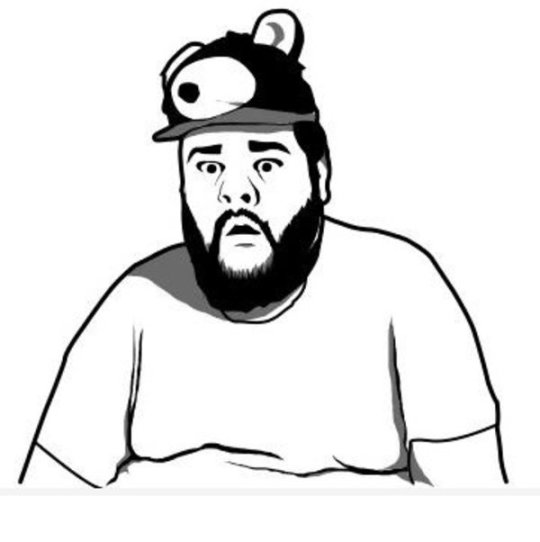
I am definitely *NOT* going to do the "DON'T YOU KNOW WHO I AM???" thing.
I only do cool and funny "Don't you know who I am?" interactions like Tony Hawk.

But when I submitted the post it reminded me of an even earlier time on Tumblr when there were only a few people who could make a post go viral.
The main one was called @thedailywhat. If something got posted there, it could get HUNDREDS of notes.
HUNDREDS!!!!
Oh, that's another funny thing. Several people commented "Why does this only have 20K notes!!???"
There are currently 135 million active users on Tumblr and the site got roughly 2.4 billion visits in 2023.
In all of 2010 the entire site got 50 million visitors. Not users. Just people who went to a Tumblr address during that entire year.
In any case, if you thought you created something cool and you wanted more than 10 people to see it, you had to submit your cool thing to The Daily What. It was the first Tumblr to reach 100,000 followers which was more than the actual founder of Tumblr had at the time.
It was run by a single person but he was very private and never revealed his name.
His emails were very cryptic.


I'm pretty sure he sold the site and went to live on a beach or something. But whoever bought it did not understand how to run the blog and the final post was in 2013.
I'm not surprised the new owner crashed and burned. Johnny Internets was irreplaceable. He really understood what would connect with people. Nearly everything he posted would gain decent popularity. I'm not sure people realize how much of a skill curating content can be and how hard it is to post popular things with consistency.
He would reject a lot of content outright and was very picky about what went on his Tumblr. But when he actually posted something you made, it was almost guaranteed to go viral.
Well, viral relative to the time period.
I suspect I submitted nearly a hundred things before he finally agreed to reblog me. And I still remember the first thing I submitted that he liked.

I posted this in 2010. How many notes do you think it got?
Probably a million, right?
No less than 100K.
I mean, look at how cute that panda is!

SONOFABITCH!
Back then, that was enough.
But that was just me putting words on something. My ultimate goal was to get him to post one of my original photoshops.

And do you see how he gave proper attribution? That meant a lot during a time when other curators were cropping my watermarks and claiming things as their own.
A real mensch, this Mysterious Stranger was.
These two posts got me enough traction to grow my following and before I knew it, I was The Daily What for other people. I was able to help other artists and content creators get traction and grow their following.
It was a beautiful Tumblr version of paying it forward. Only not as awkward as those weirdos who do it in drive-thru lines.
I ONLY GOT A SODA AND NOW I GOTTA PAY FOR 40 MCNUGGETS?
It's fine.
Enjoy your nugs.
57 notes
·
View notes
Text
michigan turning fully blue (house & senate flipped for the first time in 40 years) is not a fluke of 2022's engagement only, is not because only of abortion being on the ballot (although it was one of issues that contributed to turnout), or anything else. it is because organizers in the state have been working consistently on the issue for over half a decade.
in 2017, average everyday people got together and formed Voters Not Politicians with the goal of taking away making the state district maps away from politicians and putting it in an independent commission. Michigan is one of 3 states that has petition-driven ballots, and they were able to get enough petitions to put it on the ballot for 2018. this is after forming connections with other left-wing groups and organizations, including SEIU, teachers unions, ACLU's newly created People Power. etc. who helped contribute financially and get the word out.
VNP was at literally every corner, every store, every college campus, doing both petition signing and voter registration. they were literally up our ass every day for months. VNP was made of up average people. we were not lobbyists, we were not politicians, we were just people. the majority of them were grown adults, people in their 30s and 40s and 50s. i was the youngest person for years in my section of it in my corner of southeast michigan. i was a full-time college student and could only contribute maybe, maybe an hour of my week to it. and because of my age, i was able to show them what younger generations thought and how we worked, to connect them to college campuses and students who wanted to get involved, and so it grew yet again. and with the advertising campaign they were able to pull as well the ballot was able to pass with 61% support.
then, the GOP tried to shut it down. it went through so many courts. there was genuine fear, especially in the wake of multiple states gerrymandering efforts being shut down by their states supreme court if not the national SC, that it would happen in michigan too. but it didn't. we were lucky, and we were organized, and we had lawyers backing us up from the partnerships and relationships we had built in the years prior. we knew it was going to happen, and so we weren't caught off guard. we were ready. throughout the entire multi-year litigation it went through.
we created new maps. and then, 2022 comes. we have a shot at turning the state blue. Roe v Wade happens, but before that, organizers are doing massive voter registration as well again. people are talking to family members, to friends. political education is going on throughout the entire state, hell, the entire nation. it is a group effort. people are becoming aware of what's at stake.
and then this week happens and the results come out. it was a combination of organizer's work, of direct involvement with communities, of seeing what the GOP desires and how much they are able to destroy, of the chance of gen z outvoting boomers, that pushed everyone to work overtime to get us across the finish line. it is a combination of chance of current events combining to the perfect storm, luck for the circumstances and Michigan's unique situation (like all states having unique situations), but also heavy heavy heavy and consistent consistent consistent daily weekly and monthly work.
THAT is why michigan is blue. because we believed. because we hoped. because we got together and put in the work. because we pushed and we knew that there was a big possibility we wouldn't succeed, but we tried.
you have to try too. you have to contribute too. it is never too late to get involved. no matter what the stakes are, or how successful it is, you never know what the outcome will be 100%.
615 notes
·
View notes
Text
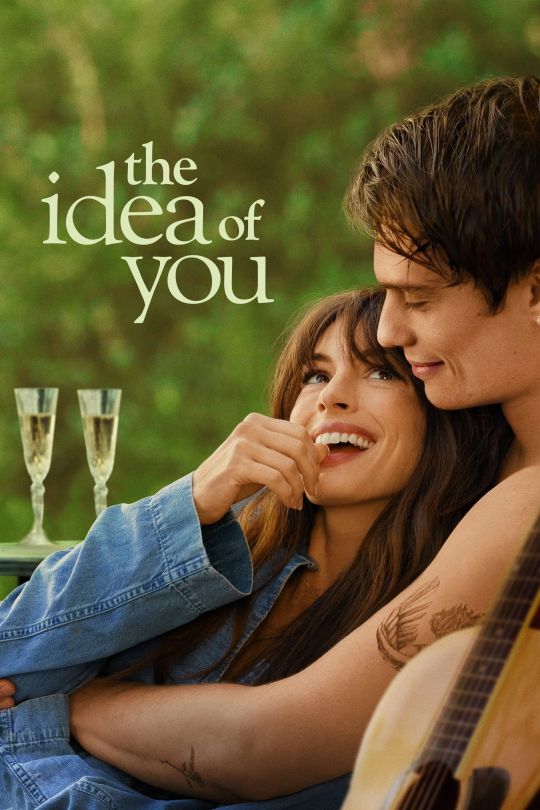
So. The Idea of You.
It’s not spoilers free. I’m talking about details and a couple of (very expected) plot twists.
As quickly mentioned before, I hadn’t huge expectations for the movie and I’ve watched only because I’m interested with what Nick as an actor, even on projects that aren’t for me or that I’m not really enthusiastic about.
My main goal was to not be angry at the end of it. And I’ve kind of succeed? I was briefly angry after one hour and forty minutes BUT nobody acted on the said stupid idea so I didn’t stay angry at the end. Yay.
Things I liked about the movie :
-Roughly the first… Lets say 50 minutes to be generous (roughly until the night at the nyc hotel included). It was silly and cringe and absolutely ridiculous but it was fun. I think it’s even funnier if you followed a band when you were a teenager and read or write the same self insert scenario in fan fictions. And since I did, I laughed a lot. Both Nick and Anne sold the thing from their first scene together. As seen during the promo tour, the duo works quite well on screen.
-The very few glimpses we had at the weight of celebrity on Hayes’ shoulders. When Solène asked if it happens a lot, when he gets recognized in the car, when simple daily life things as even grabbing a thing to eat is an impossible problem to solve, when he understands it’s because he’s famous that he’s loosing his relationship… It’s one of my favorite subjects to write about so I would have been on board with that anywhere and anytime but watching it on Hayes Nick’s face broke my heart all the same. I know this is not that kind of movie but I would have been delighted if it was more about that.
-The very few tries at portraying how boysbands created around a casting process destroy the kids they’re hiring. How each member is pushed in a little box to fit a role that is identifiable, very narrowed and marketable. How music is never at the center of anything for this kids who are dreaming of it. How they all have an expiration date and how they’re all left alone with huge mental health problems that usually leads to self-destruction. I find ironical that in a movie that is described as something for 40yo women who were told they have an expiration date, it’s the 24yo male character who is the target of that through an industry of billions of dollars in their script.
Things I disliked :
-…everything else? I swear I tried to keep an open mind about light, fun and silly cute but the majority of what I’ve watched and heard only felt shallow and empty. I was hard to root for a couple when the majority of the development of their relationship is glossed over. In the second half, bounding and solving problems are mainly portrayed the same way (tonguing each other romantically kissing). Any attempt to develop something past the first half of the movie is terrible. The writing is atrocious even for a light and fun thing. There are cute and fun moments in the second half but there are so little and rare I was mostly bored out of my mind.
-the person who wrote the PR kit and sent Anne and Nick in front of every camera around the world to say that it’s a movie about female pleasure and that female pleasure is a whole character of the movie on the base of an unrealistic 12 secondes fingering scene alone. Straight women around the world, you have my whole compassion, because that was sad as fuck. I understand all too well the need to take liberties with marketing speeches but damn 💀
Here you go! Remember that every word is a personal opinion, disliking half a movie is different from hate and hating the people who worked on it and if you want to write to me saying you disagree with every word I wrote, it’s ok too. But I suggest you to write more arguments than insults if you don’t want to waste your time 😘
21 notes
·
View notes
Text
10 WRITING GOALS PICK A GOAL & PASS IT ON
Obligatory if you don't want a goal either because you don't think you'll do it or because you have one that works for you, then this post isn't for you just ignore or reblog for someone else ^_^
These range in difficulty because I wanted there to be something approachable for everyone
1: Write 200 words everyday
2: Write 400 words everyday
3: Write 500 words everyday
4: Write 50 words everyday
5: Write a sentence everyday
6: Write one paragraph everyday
7: Write a chapter every week
8: Write 1k words every week
9: Write a short story/one-shot every week
10: Write a short story/one-shot every month
I did my best w/ these, again you don't gotta do any if either these are still too big for you [I get that !!] Or if you have a bigger/smaller goal that you do that works for you [or if you simply write better when you don't have a daily/weekly/monthly goal in mind]
My personal daily goal is 200 words a day, which I've been doing the past few days successfully, but who knows if I'll be able to keep it up, but ya know - still good !!!!
12 notes
·
View notes
Note
Helloo! just wanted to ask a question on how long it usually takes you to write a chapter for Vanguard? I myself am trying to make a twine Interactive fiction game and if you have any tips for making one that would be appreciated as well! also do you give yourself a writing goal for each day/week? also love cirrus they are so pretty! lots of love! - Sky [this is my first ask on this blog btw] <3
hi Sky!! im so glad you’re enjoying the game so far, and Cirrus. i am unfortunately very bad at sticking to goals HAHA my main one is to complete the first chapter by the end of summer, but i actually don’t have a daily word goal.
i’m actually not sure how long it takes for me to complete a chapter, but i’ve dug up my old files and apparently it took me about five months to get the prologue out. it definitely was not consistent work though, and i also don’t write when im burnt out or have writer’s block. or when im at university.
however…don’t follow my lead. i do have some tips, yet i don’t take my own advice (lol). if you really want to crank out a good amount of writing, make sure to have small daily goals (maybe even something as small as 50-100 words per day). setting huge goals and not meeting it feels bad, so i would recommend setting small ones and ensuring you meet those first. personally i also like making to do lists too :] and if you have ANY ideas for writing, just jot it down somewhere. in your notes app, google doc, etc.
in terms of making the game itself, i am a complete novice!! this is my very first IF, and i had very VERY little coding skills prior to game development. i started making Vanguard because of the incredible games i’ve played. if you want coding advice, i would highly recommend looking at @idrellegames and her blog! Wayfarer is also an amazing IF too, and was a part of the reason why i decided to make Vanguard. i also just look up tutorials on YouTube, and i’d recommend looking at Sugarcube templates, which you can find on itch.io if you look them up.
thank you for the ask, and good luck with developing your IF! ❤️❤️
14 notes
·
View notes
Text
(50 question character building:
Because I felt like making one of these for a Munday. Just some things to help you think about different details about your characters! Feel free to reblog this to use!
Character:
1. Give a three word description of your character.
2. Does your character have any nicknames?
3. What is your character’s full name?
4. Where do they live?
5. Why do they live there?
6. What is your character’s greatest strength?
7. What is one of their flaws?
8. What is your character’s gender/sexuality?
9. What feature does your character like most about themselves?
10. Is your character left handed or right handed?
11. Do they wear makeup?
12. Do they get easily sick?
13. What is their greatest fear?
14. What is the most defining moment in their life?
15. Describe a memory from their childhood.
16. What family do they have?
17. What relationship do they have with their family?
18. What relationships have they had?
19. Do they have any enemies or rivals?
20. Have they ever done anything questionable or illegal?
21. What was their favourite toy from their childhood?
22. Do they have an education?
23. Any favourite sports?
24. What hobbies do they have?
25. Do they have a job? How do they feel about their job?
26. Do they have a notable or famous ancestors?
27. What do they value most in a friendship?
28. What is the worst thing someone has done to them?
29. Do they have any dreams or ambitions?
30. What are their short-term goals?
31. How would they react if their greatest fear manifested?
32. What is their attitude in regards to material wealth?
33. Do they trust easily?
34. What foods do they especially enjoy?
35. Are they the type of character to “savour the flavour” of their food or “wolf it down”?
36. What would they do if someone attacked them?
37. If their life was to end in 24 hours, what would they do with their last moments?
38. Describe a typical dream they might have.
39. Describe a typical nightmare they might have.
40. What is their daily routine?
41. What is the most formal outfit they own?
42. What is a usual hangout spot for your character?
43. What kind of advice would they give to someone who asked them for advice?
44. If your character completely changed their body (through magic or other means), would there be any other way to identify that that was them?
45. What is currently motivating your character?
46. What colour would you most associate with your character?
47. What memory does your character cherish the most?
48. How would you character want to be remembered by?
49. What advice would your character give to their younger self?
50. Would you character consider themselves a hero, villain or something else?
Feel free to ask these questions about any of my characters!)
78 notes
·
View notes
Text
2023 Writing Wrapped!
I think I forgot to do this last year but I was a little burnt out at the time. I had so much fun writing this year I wanted to do a little retrospective/celebration for it (which I encourage everyone to do! Even if you wrote just one fic, take a second to congratulation yourself for accomplishing it).
I wrote 34 fics and updated 118 times this year. Almost half of those were for the Children of the Crystal series (16 fics) but that series was so fun and clocks in at 121k so I'm totally okay with that. If anything, that's a bit of equalizing, because I know my fics are a lot longer on average than most people's since I write a lot of longer AUs (quick math off the top of my head is about half my fics are longer AUs) so now my words-per-fic average is probably a bit closer to usual lol. Actually that got me curious and my average is 20,176 which is honestly lower than I was expecting but still almost certainly higher than average since I've seen a lot of profiles without a single fic that long. Okay I'm a nerd and I did the math and it was only 21,041 before this year which is way more surprising since I really would have thought it was more.
Anyway, I posted 610k words this year between all my fics (though I wrote more in WIPs and upcoming projects). I had so much fun with a lot of the fics I did this year. Children of the Crystal is still a stand out for me, but I'm SO proud of 'the long way down' and I spent the first half of the year pretty feral for each idea as I tore through Hurricane Adora, As Many Lives As It Takes (To Be With You), Superzero, City of Angels, Trade Today For Tomorrow, and CotC of course. February through August I averaged 12 updates a month which is. insane. I updated daily for 12 days in a row in July/August for CotC, and I spent most of that fic series updating every other day.
A lot of that creative energy came from the health stuff that has been bogging me down for a few years (and especially last year) improving, and though I'm still dealing with that, I'm doing a lot better and it has really felt like rediscovering my creative passion. I had a span from like March-ish trhough August I called my "unhinged era" between how feral I was for my ideas, how much I was updating, and just how wild some of those ideas were lol. My slow down at the end of the year came from starting a new job that was very demanding and especially exhausting with my health issues, plus health issues for the rest of my family, but I've still been averaging updating once or twice a week since, so I'm happy with that given everything that has been going on.
Now let's get to the two big ones.
Writing streaks: Definitely not for everyone, but for me they're really motivating and 100% the reason I was able to keep up momentum these last three months with work. I wrote every single day this year. I still can't believe that. Sure, some days it was literally 50 words at the end of the day when I was exhausted, but I also had my highest single-word count day since I started recording them this year at 12,738 on July 18th when I was writing CotC. My previous record was 94 days in a row. 364 is a huge leap.
I don't know where I'm going to go with my streak from here. On one hand, it was hugely motivating. On the other, you always want to be careful to prevent burnout. For now, allowing myself to count days where I barely do anything as long as I engage with my WIP seems like a good middle ground since it keeps me motivated and connected to what I'm writing while letting me mostly take time off. I'm exploring more creative hobbies like painting in my free time, though, and as long as I've created that day I don't necessarily feel the need to write, so we'll see if I reconsider my writing streak as a "creating" streak in the future, but for now I'm just going to see how long I can go.
And the final one... my stupid goal.
I can't remember if it was at the end of last year or the start of this one when an anon pointed out how much I had written and I realized I was something like .99% of all Catradora fics on AO3, but my ridiculous goal for this year was to get my fics to 1% of the entire Catradora tag. This goal... I half reached. It takes a bit of explaining.
First, when I first set that goal, I think needed to write twenty-something more fics to reach it. Obviously, I well exceeded that goal at 34 fics, but as I was writing, so was everyone else, so the number of fics I needed to write to reach 1% increased. In the sense of my original benchmark, I definitely passed my goal.
Second, as I write this, AO3 shows there are 11,632 Catradora fics. You can consider 1% of this to be either 116 or 117 depending on rounding. I have 117 She-ra fics, but one of those is a Glimbow fic with no mention of Catradora, so that takes me to 116. However, one of those 116 is tagged as Adora & Catra because it's the CotC fic from when they're small children and meeting for the first time. I consider it a Catradora fic, but it's not actually in the tag and thus doesn't contribute to it. As such, I've fallen short at 115/117, but I really do consider this goal complete for this year given that I passed the initial milestone, the rounding makes the final number debatably 116, and I do actually have 116 "Catradora-centric" fics. That said, I'm very aware those are technicalities and I have a special celebration planned for when I actually, officially become 1% of the tag, so look out for that :) It'll be a great way to celebrate the new year. I'm hoping/planning to do it in the next week or two.
The future: I'm ending this year and starting the next trying to clean up a bunch of WIPs since my fic folder is getting a little ridiculous with the (mostly Outside of the War) one-shots I've written one scene or just a description for, which feels like a really fitting way to end off the year, accomplishing my goals and making everything neat and tidy. I have like 7~ to work though, though my actual goal is maybe 4-5 since I don't want to "force" myself to work on an idea if I'm not feeling it at the second, but I also have a longer AU calling my name, and I don't want to ignore an idea interesting me either... so we'll see, but I'm excited for everything I'm working on right now, and that feels really good. I finished last year in kind of a rough place writing/creativity wise, and I'm finishing this year really excited for everything I did and everything upcoming, so that feels pretty great :)
Thank you to everyone who read and commented this year! I know I ran out of energy to keep up with comments a lot, but they really made me smile so much and I appreciate them so much. Some days they were the difference between the motivation to write 1000 words versus 50. Thanks for another great year!
17 notes
·
View notes